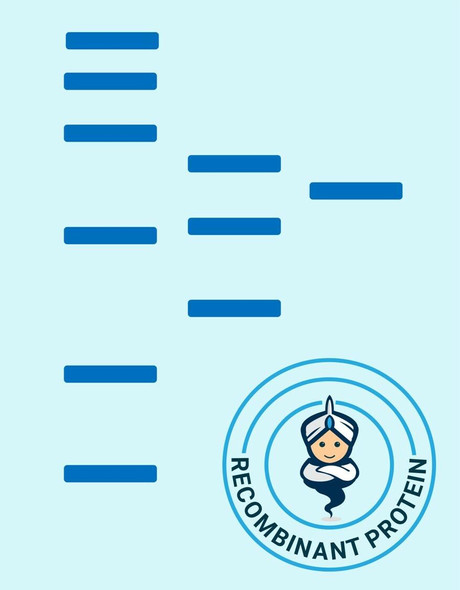Description
| Product Name: | Human CRISP3 Recombinant Protein |
| Product Code: | RPPB3256 |
| Size: | 10µg |
| Species: | Human |
| Target: | CRISP3 |
| Synonyms: | Cysteine-Rich Secretory Protein 3, Specific Granule Protein of 28 KDa, CRISP-3, SGP28, Cysteine-Rich Secretory Protein-3, Specific Granule Protein (28 KDa), DJ442L6.3, CRS3, Aeg2, CRISP3. |
| Source: | Escherichia Coli |
| Physical Appearance: | Filtered colorless solution. |
| Formulation: | CRISP3 filtered (0.4�m) solution at a concentration of 0.3mg/ml in 50mM acetate buffer pH 4, 5mM DTT and 20% glycerol. |
| Stability: | Store at 4°C if entire vial will be used within 2-4 weeks. Store, frozen at -20°C for longer periods of time. For long term storage it is recommended to add a carrier protein (0.1% HSA or BSA).Avoid multiple freeze-thaw cycles. |
| Purity: | Greater than 85.0% as determined by SDS-PAGE. |
| Amino Acid Sequence: | MKHHHHHHASNEDKDPAFTA LLTTQTQVQR EIVNKHNELR RAVSPPARNM LKMEWNKEAA ANAQKWANQC NYRHSNPKDR MTSLKCGENL YMSSASSSWS QAIQSWFDEY NDFDFGVGPK TPNAVVGHYT QVVWYSSYLV GCGNAYCPNQ KVLKYYYVCQ YCPAGNWANR LYVPYEQGAP CASCPDNCDD GLCTNGCKYE DLYSNCKSLK LTLTCKHQLV RDSCKASCNC SNSIY |
Cysteine-rich secretory protein 3 (CRISP3) is a member of the CRISP family of proteins having a pathogenesis related protein 1 (PR1) domain at its N-terminal and ion channel regulatory (ICR) domain at its C-terminal linked by a hinge region. CRISP3 transcripts are present predominantly in the prostate. CRISP3 expression is low in benign prostatic epithelium but is highly upregulated in the majority of high-grade prostatic intraepithelial neoplasia lesions and in most primary prostate tumors and metastases. CRISP3 is one of the genes which are most often upregulated in prostate cancer. Human Prostate Secretory Protein (PSP94 binds human CRISP3 with a very high affinity.
CRISP3 Human Recombinant produced in E.Coli is a single, non-glycosylated, polypeptide chain (21-245) containing 235 amino acids including a 10 aa His tag at N-terminus. The total calculated molecular mass is 26.74kDa.
| UniProt Protein Function: | |
| UniProt Protein Details: | |
| NCBI Summary: | This gene encodes a member of the cysteine-rich secretory protein (CRISP) family within the CRISP, antigen 5 and pathogenesis-related 1 proteins superfamily. The encoded protein has an N-terminal CRISP, antigen 5 and pathogenesis-related 1 proteins domain, a hinge region, and a C-terminal ion channel regulator domain. This protein contains cysteine residues, located in both the N- and C-terminal domains, that form eight disulfide bonds, a distinguishing characteristic of this family. This gene is expressed in the male reproductive tract where it plays a role in sperm function and fertilization, and the female reproductive tract where it plays a role in endometrial receptivity for embryo implantation. This gene is upregulated in certain types of prostate cancer. Alternative splicing results in multiple transcript variants. [provided by RefSeq, Nov 2016] |
| UniProt Code: | P54108 |
| NCBI GenInfo Identifier: | 1706135 |
| NCBI Gene ID: | 10321 |
| NCBI Accession: | P54108.1 |
| UniProt Secondary Accession: | P54108 |
| UniProt Related Accession: | P54108 |
| Molecular Weight: | |
| NCBI Full Name: | Cysteine-rich secretory protein 3 |
| NCBI Synonym Full Names: | cysteine rich secretory protein 3 |
| NCBI Official Symbol: | CRISP3�� |
| NCBI Official Synonym Symbols: | Aeg2; CRS3; SGP28; CRISP-3; dJ442L6.3�� |
| NCBI Protein Information: | cysteine-rich secretory protein 3 |
| UniProt Protein Name: | Cysteine-rich secretory protein 3 |
| UniProt Synonym Protein Names: | Specific granule protein of 28 kDa; SGP28 |
| Protein Family: | |
| UniProt Gene Name: | CRISP3�� |
| UniProt Entry Name: | CRIS3_HUMAN |






